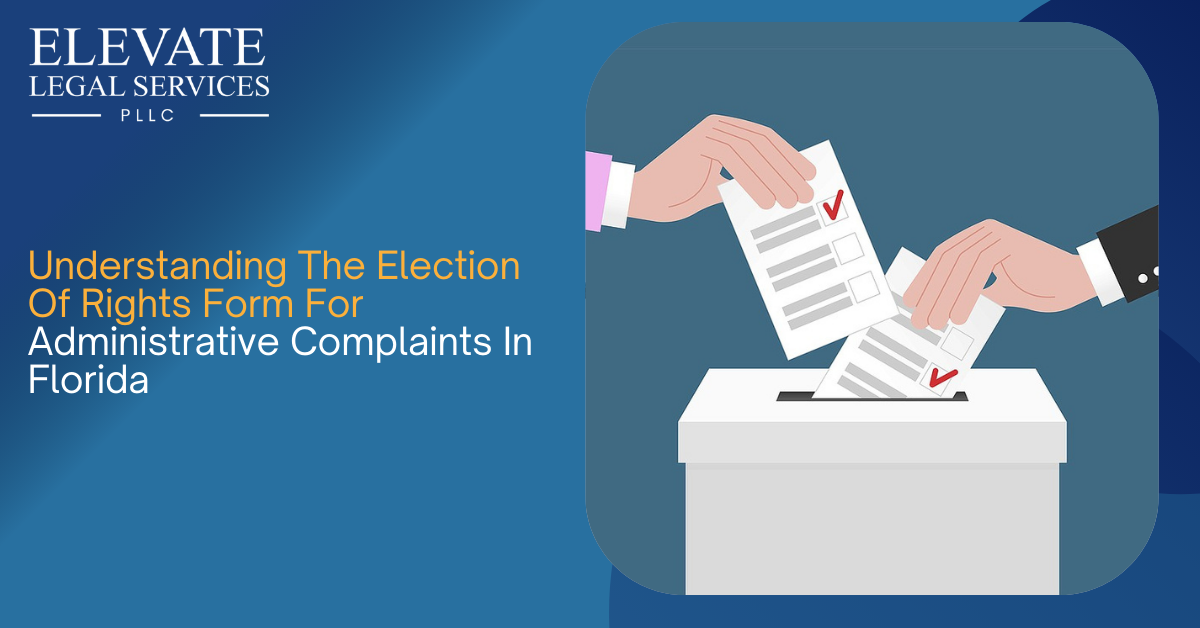
When you receive an Election of Rights form from the DBPR or FDACS, it’s crucial to understand your options and the implications of your response. Administrative Complaints can arise from various issues, including violations of state laws, failure to comply with industry regulations or professional misconduct. How you respond to these complaints can directly impact the future of your professional license and your career. The Election of Rights form outlines several paths for you to address the allegations, and choosing the correct one is key to protecting yourself. Contact Elevate Legal Services, PLLC today to learn how we can help you.
At Elevate Legal Services, PLLC, we specialize in helping professionals and businesses across Florida protect their licenses and livelihoods when facing Administrative Complaints. With years of experience representing clients before the Florida Department of Business and Professional Regulation (DBPR) and the Florida Department of Agriculture and Consumer Services (FDACS), our attorneys are well-equipped to guide you through the complex Election of Rights process. Whether you’re a licensed professional, business owner, or anyone impacted by a regulatory complaint, we’re here to help. Contact us at 561-770-3335 or email us at [email protected] for a consultation and to get started on your defense.
In this blog, we’ll explore what an Election of Rights form is, the various options it presents, and how to respond. Most importantly, we’ll discuss why it’s in your best interest to seek legal representation to protect your rights and ensure the best possible outcome.
What is an Election of Rights Form?
When an Administrative Complaint is filed against you by a Florida regulatory agency like the DBPR or FDACS, you’ll be served with an Election of Rights form. This form provides you with different options for how you can respond to the complaint. Essentially, it’s a legal document asking you to select the process by which you would like to address or contest the allegations against you.
Administrative Complaints could arise from a variety of issues, including, but not limited to, violations of professional standards, license renewal issues, or failure to comply with certain industry regulations. No matter the cause, the way you respond will have serious implications for your professional standing.

The Importance of Responding Correctly
Florida law requires that you respond to the Election of Rights form within a specific timeframe, often 21 days from when you receive it. Failure to respond within this period could result in automatic penalties, which may include the suspension or revocation of your license.
Each option provided on the form leads to a different path for resolving the complaint, and choosing the wrong option could limit your ability to defend yourself effectively. Here’s a breakdown of the options you’re likely to encounter on the form and what each one means for you.
The Options on the Election of Rights Form
The Election of Rights form typically presents you with four main options:
- Stipulation (Settlement)
- Informal Hearing
- Informal Hearing by Written Statement
- Formal Hearing
Let’s break down what each option means in detail:
1. Stipulation (Settlement)
By selecting the stipulation option, you are agreeing to the terms of a settlement offered by the regulatory agency. This usually means that you accept the facts as presented in the complaint and waive your right to contest them in a hearing. The agency may propose certain penalties or corrective actions, which could include fines, probation, or other conditions.
Pros of Choosing Stipulation:
- Quick resolution: If you believe the complaint has merit and wish to avoid a prolonged legal battle, this option provides a faster way to resolve the matter.
- Reduced penalties: In some cases, agreeing to a settlement can result in reduced penalties compared to what you might face if you challenge the complaint.
Cons of Choosing Stipulation:
- No contest: By stipulating, you’re essentially admitting to the allegations, which could harm your reputation and career.
- Limited recourse: Once you’ve signed the agreement, you cannot later change your mind and request a hearing or further challenge the complaint.
When to Consider Stipulation:
Stipulation is worth considering if the facts are indisputable and you want to minimize the consequences. However, this should not be done without legal counsel, as signing a stipulation can have long-lasting consequences for your professional license.
2. Informal Hearing
In an informal hearing, you are not disputing the basic facts of the case, but you want to explain your side of the story in person. This type of hearing typically takes place before a hearing officer from the agency, and while you won’t have the full legal formalities of a court proceeding, you will have the opportunity to present your version of events and offer mitigating factors.
Pros Of Choosing Informal Hearing:
- Face-to-face explanation: You have the chance to speak directly to the agency or hearing officer to explain your actions.
- Flexibility: Because you’re not disputing the facts, you can focus on explaining the circumstances or any reasons that might justify leniency.
Cons Of Choosing Informal Hearing:
- Limited defense options: Since you’re not disputing the facts, you can’t argue that the complaint is unfounded or incorrect.
- No guarantee of reduced penalties: While you can explain your actions, the hearing officer may still impose significant penalties.
When To Consider Informal Hearing:
If the facts in the complaint are true, but you believe there are mitigating circumstances that should lessen your punishment, an informal hearing can be a good option. However, representation is key to making sure your explanations are presented effectively.
3. Informal Hearing By Written Statement
If you’d prefer not to appear in person, you can opt to submit a written statement instead. In this case, you’ll provide a written explanation of the facts and any mitigating circumstances to the agency. Like the informal hearing, this option assumes you are not disputing the facts of the case.
Pros Of Choosing Informal Hearing By Written Statement:
- No need for a personal appearance: If you can’t or don’t want to attend a hearing in person, this option allows you to respond in writing.
- Can be convenient and less intimidating than a hearing.
Cons Of Choosing Informal Hearing By Written Statement:
- No opportunity for interaction: You won’t be able to answer questions, clarify points, or gauge the agency’s reaction to your statement.
- Your statement might not fully convey your position: Written statements can sometimes lack the persuasive power of a personal appearance, especially in a complex case.
When To Consider Informal Hearing By Written Statement:
This option may be ideal if you’re out of state or have other commitments that prevent you from attending a hearing in person. However, it’s often harder to defend your case through a written statement alone, and this choice should be carefully considered with the help of legal representation.
4. Formal Hearing
A formal hearing is the most involved and adversarial option, and it’s appropriate if you dispute the facts of the complaint and wish to challenge them. In this case, your hearing will be held before an Administrative Law Judge (ALJ) through the Division of Administrative Hearings (DOAH). The process resembles a court trial where both sides present evidence and witnesses, and you’ll have the opportunity to argue that the facts in the complaint are incorrect.
Pros Of Choosing Formal Hearing:
- Full defense: You can present evidence and call witnesses to dispute the allegations.
- Legal protections: A formal hearing follows strict procedural rules, and you have more legal rights compared to an informal hearing.
- Potential for case dismissal: If you can successfully argue that the allegations are unfounded, you may face no penalties at all.
Cons of Choosing Formal Hearing:
- Complexity: Formal hearings are more complicated and time-consuming than other options. You’ll need to present a well-organized defense.
- Legal costs: Given the complexity, it’s almost always necessary to hire an attorney, which can increase costs.
- Potential for severe penalties: If the Administrative Judge rules against you, the penalties can be as severe, if not more so, than those proposed in the original complaint.
When To Consider Formal Hearing:
If you believe the allegations are false or exaggerated, and you have evidence to support your claim, then a formal hearing may be your best option. Because of the complexities involved, it’s strongly recommended that you seek legal representation to maximize your chances of success.
The Importance Of Legal Representation
The decision you make on the Election of Rights form will have a direct impact on your professional future, and you should not take this lightly. Each option has its own risks and rewards, and the right choice depends on the specifics of your case.
When faced with an Administrative Complaint, many individuals feel overwhelmed and uncertain about what to do next. This is where a skilled attorney can make all the difference. Legal representation ensures that you fully understand the consequences of each option, helps you craft a strong defense, and increases your chances of achieving a favorable outcome.
The Role Of Elevate Legal Services, PLLC
At Elevate Legal Services, PLLC, we understand how stressful and overwhelming it can be to face an Administrative Complaint. Our experienced attorneys have represented countless professionals and businesses before the DBPR and FDACS, and we’re ready to help you defend your rights and protect your professional future. Whether you’re considering a stipulation, preparing for a hearing, or contesting the facts of a complaint, we’ll guide you every step of the way.
Why You Should Contact Us
- Experience: We have years of experience handling Administrative Complaints and know how to work with Florida regulatory agencies.
- Tailored Defense: We’ll carefully review the details of your case and develop a defense strategy that gives you the best chance of success.
- Peace of Mind: By letting us handle your case, you can focus on your career while we focus on protecting your rights.
Conclusion
Receiving an Election of Rights form for an Administrative Complaint in Florida can be an intimidating experience, but you don’t have to navigate it alone. By understanding your options—whether it’s stipulating the facts, requesting an informal hearing, or opting for a formal hearing—and seeking professional legal guidance, you can ensure that your rights are protected, and your case is presented in the best possible light.
If you’ve received an Election of Rights form and aren’t sure which option to choose, don’t leave your future to chance. Call Elevate Legal Services, PLLC, today at 561-770-3335 or email us at [email protected] to schedule a consultation today. Let us put our experience to work for you, ensuring the best possible outcome for your case.





